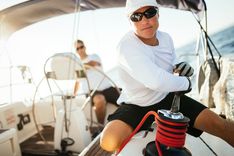Effective Waste Management on a Croatian Sailing Trip
Any sailing trip—especially along the stunning Croatian coast—requires effective waste management to preserve the beauty and health of the marine environment. Proper practices ensure a safe and enjoyable journey while minimizing environmental impact. This guide provides actionable strategies for collecting, storing, and disposing of waste in compliance with local regulations to promote a sustainable yachting culture.
Why Waste Management Matters
Poor waste practices can harm marine ecosystems, endanger wildlife, and compromise the safety and aesthetics of your sailing experience. Key reasons for proper waste management include:
Environmental Protection
- Plastic Pollution: Discarded plastics, such as bags or fishing lines, can enter the marine food chain, harming fish, seabirds, and other marine life.
- Microplastics: Small plastic fragments degrade water quality and disrupt ecosystems.
Aesthetic and Health Concerns
- Trash-filled beaches and coves lose their natural appeal and may harbor harmful bacteria.
Legal Compliance
- Coastal regions, including the Adriatic Sea, enforce strict rules regarding onboard waste disposal. Violations can result in fines and harm the reputation of charter operators.
Types of Onboard Waste and Disposal Tips
Proper waste sorting and disposal are crucial to maintaining a clean and organized yacht. Below are common waste types and how to manage them effectively:
Plastic and Containers
- Sources: Water bottles, food containers, single-use packaging.
- Tip: Designate a special bin for plastics and ensure they are recycled at marinas with proper facilities.
Organic Waste
- Sources: Food scraps like fruit peels, coffee grounds, leftovers.
- Tip: Compost organic waste onshore if facilities are available. Avoid throwing food scraps overboard unless permitted far from the coast.
Paper and Cardboard
- Sources: Paper towels, grocery cartons.
- Tip: Flatten cardboard to save space and recycle at marinas offering paper bins.
Glass and Metal
- Sources: Bottles, cans, tins.
- Tip: Rinse containers to prevent odors and insects, and store them for recycling.
Toxic Waste
- Sources: Oils, chemicals, batteries.
- Tip: Dispose of hazardous materials at designated marina facilities to prevent contamination.
Best Practices for Onboard Waste Management
Implementing effective waste management strategies ensures hygiene, minimizes clutter, and protects the environment:
Separate Waste at the Source
- Place clearly labeled bins for plastics, organics, paper, and glass/metal in accessible locations.
Reduce Volume
- Flatten cardboard boxes and crush cans to save space in waste storage areas.
Use Sealable Bags or Bins
- Choose sturdy, sealable bags to prevent leaks and odors. Lockable lids deter marine life or birds from rummaging through waste.
Follow Disposal Rules
- Never throw trash overboard. In Croatia, all waste should remain onboard until disposed of at designated marina facilities.
Marina Facilities for Waste Disposal
Croatian marinas are equipped with waste management facilities to help sailors dispose of trash responsibly:
Recycling Stations
- Many marinas accept plastic, paper, glass, and metal for recycling.
Hazardous Waste Disposal
- Designated facilities handle items like used batteries, oily rags, and leftover paint.
Fees and Schedules
- Some marinas charge disposal fees or operate within specific hours. Plan ahead to avoid inconveniences.
Minimizing Waste Creation
The easiest way to manage waste is to reduce its generation. Thoughtful provisioning can significantly reduce the amount of onboard trash:
- Bring Reusable Items: Use shopping bags, food storage containers, and refillable water bottles to avoid single-use plastics.
- Buy in Bulk: Choose bulk packaging over individually wrapped goods to minimize waste.
- Use Biodegradable Products: Opt for eco-friendly soaps, shampoos, and cleaning agents to prevent harmful chemicals from entering the water.
Establishing an Eco-Conscious Onboard Culture
Encouraging an environmentally responsible mindset among crew members ensures waste management practices are followed effectively:
- Orientation Sessions: At the start of the trip, brief guests on waste segregation, recycling rules, and onboard policies.
- Assign Responsibilities: Delegate tasks like waste sorting and recycling to promote teamwork.
- Emphasize "Leave No Trace": Reinforce the importance of leaving the environment as pristine as it was found.
Conclusion
Effective waste management is a shared responsibility for anyone sailing the Adriatic Sea. By utilizing marina facilities, adhering to local regulations, and implementing onboard practices like waste sorting and recycling, travelers can minimize their environmental impact.
Choosing sustainable provisioning and maintaining a "leave no trace" philosophy ensures Croatia’s marine ecosystems remain vibrant for future generations. Through careful planning and thoughtful waste management, sailors can contribute to cleaner waters and a more sustainable yachting culture—ensuring the Adriatic’s beauty remains intact for years to come.





